Randy Alcorn's Blog, page 116
June 27, 2018
Three People Who Through Suffering Became Extraordinary

Seeing positive outcomes of some suffering should lead us to trust that God can bring good from all suffering. Consider three people who through suffering became extraordinary:
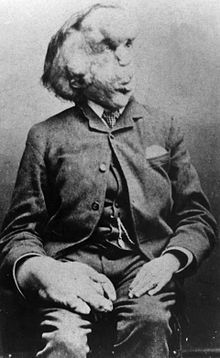 Doctors once thought that Joseph Merrick, “The Elephant Man,” had elephantiasis, though now they believe he suffered from Proteus syndrome, which causes abnormal growth of bones, skin, and other systems. Joseph was born in England in 1862 and appeared normal until age three. By age eleven, his deformities had grown severe; at that time his mother died, and later his new stepmother kicked him out.
Doctors once thought that Joseph Merrick, “The Elephant Man,” had elephantiasis, though now they believe he suffered from Proteus syndrome, which causes abnormal growth of bones, skin, and other systems. Joseph was born in England in 1862 and appeared normal until age three. By age eleven, his deformities had grown severe; at that time his mother died, and later his new stepmother kicked him out.
He became a door-to-door salesman but suffered constant harassment. His condition worsened: protruding, cauliflower-like growths appeared on his head and body, and his right hand and forearm became useless. No longer able to do physical work, he took a job as a curiosity attraction. After a promoter robbed and abandoned him, he returned to London and visited Dr. Treves at the London Hospital, where he received permanent living quarters. Despite his adversities, Joseph Merrick remained cheerful and gentle, and never grew bitter. He found comfort in writing, including poetry. He died at age twenty-seven.
Merrick often ended his letters of thanks with a poem by hymn-writing theologian Isaac Watts: “’Tis true my form is something odd; / But blaming me, is blaming God.... / I would be measured by the soul; / The mind is the standard of the man.”
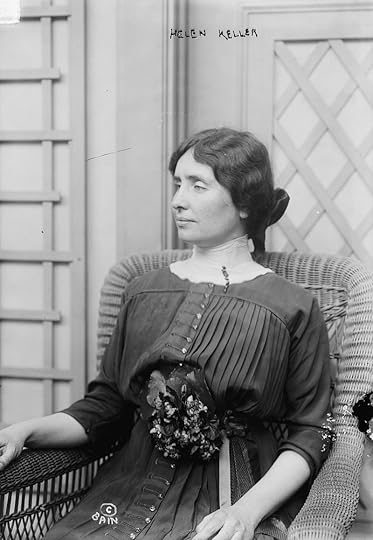 Helen Keller was born in Alabama in 1880. A year later, illness took her vision and hearing. At age seven, her parents hired Anne Sullivan, whose innovative tutoring transformed Helen’s life. Helen learned to speak at ten, and though listeners had trouble understanding her, she never gave up. She attended college and wrote several books, including The Story of My Life. She devoted herself to research, speaking, and raising money for organizations such as the American Foundation for the Blind. Helen traveled the world on behalf of the blind and visited thirty-five countries. At age seventy-five, she embarked on a five-month-long, forty-thousand-mile tour through Asia, bringing encouragement to millions.
Helen Keller was born in Alabama in 1880. A year later, illness took her vision and hearing. At age seven, her parents hired Anne Sullivan, whose innovative tutoring transformed Helen’s life. Helen learned to speak at ten, and though listeners had trouble understanding her, she never gave up. She attended college and wrote several books, including The Story of My Life. She devoted herself to research, speaking, and raising money for organizations such as the American Foundation for the Blind. Helen traveled the world on behalf of the blind and visited thirty-five countries. At age seventy-five, she embarked on a five-month-long, forty-thousand-mile tour through Asia, bringing encouragement to millions.
 Christy Brown was born in Dublin in 1932. His cerebral palsy caused everyone to consider him mentally handicapped until he used his left foot to grab a piece of chalk from his sister. His mother taught him to read and write. Well into adolescence, he could not speak intelligibly. He wrote an autobiography titled My Left Foot as well as several other novels and poetry collections. He typed using only his left foot. People loved Christy Brown for his warm and cheerful personality.
Christy Brown was born in Dublin in 1932. His cerebral palsy caused everyone to consider him mentally handicapped until he used his left foot to grab a piece of chalk from his sister. His mother taught him to read and write. Well into adolescence, he could not speak intelligibly. He wrote an autobiography titled My Left Foot as well as several other novels and poetry collections. He typed using only his left foot. People loved Christy Brown for his warm and cheerful personality.
These stories don’t prove that God always brings good out of evil in this life. But they do prove that He sometimes does. Shouldn’t that give everyone hope?
Excerpted from Randy’s book If God Is Good: Faith in the Midst of Suffering and Evil.
Photo by Stephen Walker on Unsplash
June 25, 2018
Will We Witness Together God’s New Creation?

In The Magician’s Nephew, C. S. Lewis portrays two children, a few adults, and a horse transported from Earth to an unknown place. It’s the darkness and silence that precedes the day of Narnia’s creation. They watch in wonder as this beautiful new world is masterfully shaped by the creator, Aslan the lion, who sings it into existence.
God asked Job, “Where were you when I laid the earth’s foundation? . . . On what were its footings set, or who laid its cornerstone—while the morning stars sang together and all the angels shouted for joy?” (Job 38:4-7).
The picture is of angels, created beings, witnessing God’s creation of the first Earth. I believe Scripture makes clear that we’ll have the privilege that was experienced by the fictional characters in The Magician’s Nephew and by the real angelic beings who witnessed the creation of the first Earth: We will actually witness the creation of the New Earth.
In John’s vision, after he saw humanity’s resurrection, he saw “a new heaven and a new earth, for the first heaven and the first earth had passed away. . . . I saw the Holy City, the new Jerusalem, coming down out of heaven from God” (Revelation 21:1-2).
Although Scripture doesn’t state this, the New Earth’s creation might unfold in stages just as the old Earth’s creation did. The first Earth was raw and uninhabitable, dark and empty (Genesis 1:2). God then created light, and on subsequent days He created water, sky, clouds, dry ground, vegetation, seed-bearing plants and trees, sun and moon and stars, and the entire celestial heavens. Then He made the sea creatures, birds, and the rest of the animals, domestic and wild. Finally, he fashioned the man.
God may form the ground of the New Earth directly from the old. He may form the waters of the new from the old. Romans 8 implies He will form the plants and animals of the New Earth from the old Earth, just as He will form our resurrected bodies out of genetic material from our old ones.
This time, however, new mankind will preexist the New Earth. But as He did for Adam and Eve, God will prepare it for us before we step foot on it. Perhaps on the sixth day of the new creation, instead of being formed from the dust to begin civilization, new men and women—who have beheld the new creation—will be brought down in the great city to settle on the New Earth, to continue and expand civilization to the glory of God.
Perhaps we’ll watch God at work for another creative week, beholding His unfolding wonders one by one. Of course, since the forming of the New Earth is a resurrection of the old Earth, not a creation from nothing, its creation may be instantaneous. Either way, it will be spectacular, and we will watch and ooh and aah and applaud.
Just as God presented Eve to Adam in Eden, so He will bring Christ’s bride to the second Adam, Christ, on the New Earth.
We will behold the wondrous creation of the New Earth—and then we will descend to live in that place, reigning forever with our beloved King Jesus.
Excerpted from Randy’s book Heaven.
June 22, 2018
When It Comes to God’s Truth, Searching or Being Sincere Isn’t Enough

Suppose a professor or inspirational speaker says, “What’s important isn’t finding the truth, it’s searching for it.” Try applying the same logic to your search for a life preserver when you’re drowning!
Or, “Truth is whatever you believe, as long as you’re sincere.” Certainly, you can step off a building sincerely believing you won’t fall. But gravity cares nothing about your sincerity. Even sincere people are often wrong, sometimes catastrophically so.
In this video, I share more thoughts about the importance of finding God’s Truth:
For more on this subject, see Randy’s devotional Truth: A Bigger View of God's Word.
Photo by NICK SELIVERSTOV on Unsplash
June 20, 2018
If You Read Only One Book Besides the Bible This Summer, Make It This One

In this two-minute video, teacher and author Jen Wilkin answers the question, “Which book do you wish every Christian would read, and why?” Watch her answer:
I agree with Jen—Tozer’s book is an important one for Christians today to read. Why? Because he speaks of the attributes of God, including those we’re tempted to minimize. Our theologically-weak Christian culture desperately needs an infusion of Christ-centered doctrine that encourages us to go deep in knowing and loving God.
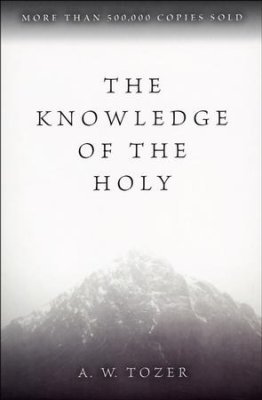 Tozer writes things like this: “What comes into our minds when we think about God is the most important thing about us. . . . No religion has ever been greater than its idea of God. . . . The most portentous fact about any man is not what he at a given time may say or do, but what he in his deep heart conceives God to be like.”
Tozer writes things like this: “What comes into our minds when we think about God is the most important thing about us. . . . No religion has ever been greater than its idea of God. . . . The most portentous fact about any man is not what he at a given time may say or do, but what he in his deep heart conceives God to be like.”
Speaking of the book’s impact, I remember having lunch several years ago with Gerry Breshears, theology professor at Western Seminary, and Bruce Ware, who teaches theology at Southern Seminary.
Bruce asked me, “Randy, what book besides the Bible has had the greatest influence on your life?” I said, “That’s easy. Without a doubt it’s A. W. Tozer’s The Knowledge of the Holy.”
Bruce looked at me and said, “You’re kidding! That’s the book that has had the biggest influence on my life.”
And then Gerry Breshears said, “I’m not kidding! That’s the number one book for me, too.”
So I challenge you to read The Knowledge of the Holy for yourself this summer and find out why this classic book has impacted so many theologians, teachers, writers, and countless others who love Jesus. It would also be a great one to listen to on audio while you’re working out or driving!
Photo: Pexels via Pixabay
June 18, 2018
Some Concerns about Jesus Calling, and Thoughts on the Sufficiency of Scripture

Few Christian books have sold as well and been shared as widely as Sarah Young’s devotional Jesus Calling. It has inspired a number of spinoffs, including Jesus Lives, Dear Jesus, Jesus Calling for Little Ones, Jesus Calling Bible Storybook, Jesus Calling: 365 Devotions for Kids, and Peace in His Presence. Altogether, they’ve sold more than 25 million books worldwide.
Recently the Evangelical Christian Publishers Association named Jesus Always, Sarah’s follow up to Jesus Calling, as its 2018 Christian Book of the Year. Given the widespread influence of her books, which is only growing, it seemed time to address some concerns directly on my own blog. (This blog is way longer than my normal posts. If you wish to leave a Facebook comment or send an email, please read the post in its entirety first so you have the full content.)
First Some Clarifications
 I’ve hesitated a long time to write about Jesus Calling, because I don’t want to send the wrong message. I’m not saying God doesn’t or can’t speak to you or others through it. He can speak through whomever He wants to, however and whenever. For example, many people have told me they learned about God’s love for them for the first time while reading The Shack. The author puts words in God’s mouth, is a universalist, and effectively denies Hell, and yet I believe God can use a book in people’s lives despite serious errors. (See my lengthy article on The Shack and my shorter blog on Paul Young’s book Lies We Believe About God.)
I’ve hesitated a long time to write about Jesus Calling, because I don’t want to send the wrong message. I’m not saying God doesn’t or can’t speak to you or others through it. He can speak through whomever He wants to, however and whenever. For example, many people have told me they learned about God’s love for them for the first time while reading The Shack. The author puts words in God’s mouth, is a universalist, and effectively denies Hell, and yet I believe God can use a book in people’s lives despite serious errors. (See my lengthy article on The Shack and my shorter blog on Paul Young’s book Lies We Believe About God.)
But how can I argue with my friends who say God used The Shack to deepen their walk with Christ? All I can say is, there are things in the book I don’t believe are true to God’s Word—and there are things in Lies We Believe About God that definitely contradict Scripture.
Now, my reservations with Jesus Calling are NOT that I believe the book is full of heresies. No doubt, there’s much that is valid and true. But I think there are still cautions that need to be shared. What concerns me is the basic premise of someone actually recording words of Jesus that they believe God has spoken to them, but which don’t appear in Scripture (even if most of them don’t contradict Scripture). That’s what I’ll focus on in this blog.
The Most Troubling Issue with Jesus Calling
For those not familiar with the format of the book, each entry of the devotional has a message written as though Jesus is speaking directly to the reader, followed by a list of related Scripture references. (Some recent versions include the actual biblical text, which is definitely an improvement.)
In the introduction to Jesus Calling Sarah Young writes,
…I began to wonder if I could change my prayer times from monologue to dialogue. I had been writing in prayer journals for years, but that was one-way communication: I did all the talking. I knew that God communicated with me through the Bible, but I yearned for more. Increasingly, I wanted to hear what God had to say to me personally on a given day. I decided to listen to God with pen in hand, writing down whatever I believed He was saying. I felt awkward the first time I tried this, but I received a message. It was short, biblical, and appropriate. It addressed topics that were current in my life: trust, fear, and closeness to God. I responded by writing in my prayer journal.
My journaling had changed from monologue to dialogue. Soon, messages began to flow more freely, and I bought a special notebook to record these words. This new way of communicating with God became the high point of my day. I knew these writings were not inspired as Scripture is, but they were helping me grow closer to God.
I have continued to receive personal messages from God as I meditate on Him.
The biggest problem with Jesus Calling is very simple: Jesus did not speak these words. If these were His words, then Jesus Calling would be Scripture, which is by definition the words of God. So if it’s not (and it isn’t) on an inspired and trustworthy level like Scripture itself, then it’s making a false claim. In fact, regardless of whether it’s biblically sound, it’s an entire book built on falsehood.
The Influence of God Calling
Tim Challies addresses the fact that in the early printings of Jesus Calling, Sarah Young acknowledged her profound debt to the “Two Listeners” who wrote the book God Calling. That has now been removed from the introduction, but it doesn't change the fact that God Calling influenced her deeply. Here's one of many troubling passages from God Calling:
How often mortals rush to earthly friends who can serve them in so limited a way, when the friends who are freed from the limitations of humanity can serve them so much better, understand better, protect better, plan better, and even plead better their cause with Me.
In other words, look to dead people for guidance and help. I remember vividly the negative effect God Calling had in churches. As Tim notes, “This book [God Calling] was unorthodox both in its writing and in its content and in many ways more closely resembles the New Age movement than orthodox Christianity. Still, Young says it ‘became a treasure to me.’”
The fact that this book had such a profound impact on her is concerning.
Speaking Words “from God”
When Sarah writes, “I decided to ‘listen’ with pen in hand, writing down whatever I ‘heard’ in my mind,” she is taking her subjective sense of God speaking to her and trusting that her words to readers are actually, in some sense, God’s Words. This is putting words in His mouth, and incredibly dangerous. It’s like The Shack in that regard, where different members of the trinity are quoted as saying specific words. But while Paul Young at least acknowledged he was writing fiction, Sarah Young appears to claim that her words are given to her by Jesus.
She goes on to explain, “I have written from the perspective of Jesus speaking, to help readers feel more personally connected with Him. So the first person singular (‘I,’ ‘Me,’ ‘My,’ ‘Mine’) always refers to Christ; ‘you’ refers to you, the reader.”
Now, Sarah tries to balance this by writing, “The Bible is, of course, the only inerrant Word of God; my writings must be consistent with that unchanging standard.” I appreciate that, and of course I agree that’s true for any author, me included. We should all be like the Bereans, evaluating what we read against Scripture (Acts 17:11). So we write what we think honors God and is in keeping with His word. However, we should always know that inevitably we will say some things that are not what God would actually say. Why? Because we are flawed and imperfect and our words are not God-breathed, as Scripture is.
I’m certainly in favor of Sarah or anyone else journaling what they believe God is speaking to them as they read Scripture. But I’m not in favor of publishing it for others to believe these are words God is speaking to them. If someone wrote a book attributing their own words to Bill Gates, Tom Brady, Chuck Norris, or Julia Roberts, what would happen? In addition to the lawsuits, no one would trust the author.
If personal pronouns attributing the author's words to Jesus weren’t used, and instead Sarah said “These are thoughts God brought to my mind,” then you could evaluate what she has written in light of Scripture. But Jesus Calling is simply written from Jesus’ perspective, as if they’re direct quotations from Him, which is radically different. And when people read it, many of them actually respond, even if subconsciously, as if these ARE the words of Jesus.
I have a friend who loves Jesus Calling and says she reads it just as she would read a book by me or anyone else, realizing the words are Sarah Young’s, not the perfect words of Jesus. But of course when it is supposedly Jesus speaking the words, many readers who aren’t biblically grounded will naturally think “Jesus is speaking, and I need to believe what He’s saying.”
So yes, some people no doubt realize these are not the words of Jesus, but that’s easy to forget when the premise is (and the use of the personal pronouns indicate) that this really is Jesus speaking, not merely a flawed human author.
No other Christian writers I know of claim that God has spoken direct words to them, and that what they are writing are the words He had to say. Sure, all of us writers share our particular interpretations of what Jesus said. But Sarah appears to be making a greater claim by saying me and mine and I as though channeling Jesus, rather than quoting His words from the Bible.
It’s fine to have teachers who say, “This is what I think the Bible means.” It can be helpful as long as we’re careful to use discernment and evaluate the teaching based on Scripture. But this is looking at something outside of the Bible as if it were the word of God, and some sort of further insight from Jesus. Hence, whatever the author’s intention, it becomes equal to God’s Word, or even a substitute for it.
God warns us sternly, “Do not add to what I command you and do not subtract from it, but keep the commands of the Lord your God that I give you” (Deuteronomy 4:2, NIV).
Revelation 22:18-19 says, “I warn everyone who hears the words of the prophecy of this scroll: If anyone adds anything to them, God will add to that person the plagues described in this scroll. And if anyone takes words away from this scroll of prophecy, God will take away from that person any share in the tree of life and in the Holy City, which are described in this scroll.”
“Prophecy” is not merely prediction; it means “speaking words from God,” or what the speaker claims are words from God. How do we add to God’s Word? One way is by claiming that the words we say are His. No matter what else we might say, if we go beyond quoting Scripture, and say other things that we claim to be from God, then we’re equating them with Scripture, and thereby adding to God’s Word. Effectively, we’re also taking away from Scripture by denying its sufficiency and demeaning its exclusive authority.
God’s Word Is Sufficient
Sarah writes in her introduction, “I knew that God communicated with me through the Bible, but I yearned for more. Increasingly, I wanted to hear what God had to say to me personally on a given day.”
“Yearned for more” seems to indicate that what God has revealed in His inspired Word is not enough. And it’s not enough for readers either, or they wouldn’t need to go to her to hear what “Jesus” says.
But God’s Word has no substitute. It is sufficient, of a different nature than anything else. “But [Jesus] answered, ‘It is written: Man must not live on bread alone but on every word that comes from the mouth of God’” (Matthew 4:4). “All Scripture is God-breathed and is useful for teaching, rebuking, correcting and training in righteousness” (2 Timothy 3:16).
James Montgomery Boice once said that the real battle in our times would not be the inerrancy or infallibility of Scripture, but its sufficiency—are we going to rely on the Bible or will we continually long for other revelation? In Jesus Calling we see this so clearly. Young teaches that though the Bible is inerrant and infallible, it is insufficient. It was not enough for her and, implicitly, she teaches that it cannot be enough for us. After all, it was not reading Scripture that proved her most important spiritual discipline, but this listening, this receiving of messages from the Lord. It is not Scripture she brings to us, not primarily anyway, but these messages from Jesus.
The danger with books like this is that readers could think, “Reading and studying God’s Word isn’t as dynamic or interesting or personal as reading what Sarah writes.” Yet Scripture encourages us to go deep in studying and contemplating God’s Words, and to find our greatest pleasure in them:
“Like newborn infants, desire the pure milk of the word, so that you may grow up into your salvation” (1 Peter 2:2, CSB).
“When your words came, I ate them; they were my joy and my heart's delight” (Jeremiah 15:16a).
Psalm 1 talks about the righteous person who delights greatly in God’s Law. Likewise, we need to make sure our primary delight is in Scripture—not a particular writer, pastor, or teacher. A good test for readers of Jesus Calling is, “Am I motivated to spend more or less time in God’s Word after reading this?” In other words, does it drive you toward Scripture in a deeper and more serious way, or does it leave you feeling as if you’ve heard what you need to from God and received all the inspiration and peace you need for your day?
To be clear—I don’t think there is anything wrong with devotionals (I’ve written a number of them myself), provided they point us back to God’s Word as our primary source of strength, encouragement, correction, and direction. There are plenty of wonderful ones out there, from classics like Charles Spurgeon’s Morning and Evening to modern books like Joni Eareckson Tada’s A Spectacle of Glory and Tim Keller’s God's Wisdom for Navigating Life: A Year of Daily Devotions in the Book of Proverbs. Another excellent choice is the ESV Devotional Psalter, which pairs each of the 150 psalms with devotional content written by Dane Ortlund.
But these devotionals are distinctly different from Jesus Calling, in that they never claim to be the words of Jesus except when directly quoting Scripture. The author’s comments, like mine in all my books, are in no sense presented as the actual words of God.
In an interview with the New York Times, Sarah writes, “I agree that revelation has ceased in the sense that the Bible is complete. However, what I am doing is devotional writing, and I do so by asking Jesus to guide my mind as I spend time with Him—to help me think His thoughts.” This sounds to me like Sarah wants to affirm the Bible’s uniqueness, yet at the same time believes she is writing out the thoughts of God with such confidence that she can put her words into the mouth of Jesus.
Why Does All This Matter?
We live in a day when biblical literacy is at an all-time low. The next book that fans of Jesus Calling read which claims to be words from Jesus may be mostly false, not true. Some will probably have the discernment to see where it contradicts the word of God, but many or even most people won’t. Sadly, very few people today are deeply immersed in Scripture. That’s the reason for my concern.
Another concern is that the “Jesus” Sarah presents in her book frequently has a very one-sided message. That can leave readers with a lopsided view of Jesus, one which doesn’t fully appreciate the depths of His character. And whether consciously or subconsciously, the messages we read in books do shape our view of God and our worldview.
In her response to the book, Kathy Keller, wife of pastor and author Tim Keller, writes,
Ms. Young says near the end of her introduction: “I have found themes of His Peace becoming more prominent in my writing. I’m sure this tendency reflects my personal need. However, when I get to know people, I find that most of them also desire the balm of Jesus’ Peace.” No doubt.
But is that all that God wants us to hear from him? Only messages of peace and comfort? Ms. Young thinks so (and says so, in the introduction), and her messages are consistently filled with that theme. Yet if you take even a very simple read-through-the-Bible-in-a-year plan, like the one devised by Robert Murray M’Cheyne, you will find yourself encountering a complex, transcendent God, one who is holy, mysterious, righteous—not a tame God. He does promise his peace, deeply and profoundly, but there are many other things that God has said that we need to hear, or he wouldn’t have given us the whole Bible.
We should believe all that Scripture says about Jesus—whether it is palatable and makes sense to our finite little minds or not. He’s all the things the Bible reveals Him to be, including judge, friend, shepherd, and master. His attributes aren’t a smorgasbord for us to choose what we want and leave the rest untouched.
Jesus spoke some of the harshest words of condemnation in Scripture. The gentle, compassionate Jesus is also the Jesus who drove the merchant-thieves from the temple and spoke condemnation against self-righteous religious leaders. His less popular qualities so outraged people that they nailed Him to a cross.
We must look at the complete Jesus revealed in Scripture, lest we remake Him in our image, with His only attribute love or peace. By seeing Him in His holiness and love, His truth and His grace, we’ll learn to see the fullness of His beauty.
So whether or not you agree there are shortcomings and dangers with the Jesus Calling books, let’s all agree to dig deep into Scripture, making it our primary source of delight, joy, strength, encouragement, and yes, peace. Then, and only then, will we have the discernment to read other books as secondary and fallible, and only God’s Word as primary and infallible. If you’re going to quote Jesus (and I hope you do!), use the words He actually said, not the words He is portrayed as saying in Jesus Calling, or any other book.
Further Reading
Here are some articles that offer what I think are some valid cautions. I don’t agree with everything every one of them says (and some of them overlap with others), but as a whole I think most of their concerns are noteworthy:
10 Serious Problems with Jesus Calling
Is Jesus Calling a good book? Are there any doctrinal problems with Jesus Calling?
The Jesus Calling Controversy in a Nutshell
Book Review on The Jesus Calling
10 Scriptural reasons Jesus Calling is a dangerous book
Jesus Calling by Sarah Young: A False Jesus?
Related books by Randy Alcorn: Truth: A Bigger View of God’s Word and The Grace and Truth Paradox.
Photo by Nathan Dumlao on Unsplash
June 15, 2018
In Honor of Karen Stout Coleman, Beloved EPM Coworker and Friend

On Sunday, June 10, at 10:45 a.m., Karen Stout Coleman went to be with Jesus. Nanci and I have known many Christlike people, but she’s on the shortlist. This amazing sister has been a dear friend to us, full of grace and truth in the face of hardships, never losing her wit and humor, quietly saying the funniest and wisest things. She is truly one of my heroes. And now she’s with her Lord and Savior, after being diagnosed with stage four metastatic breast cancer in March.
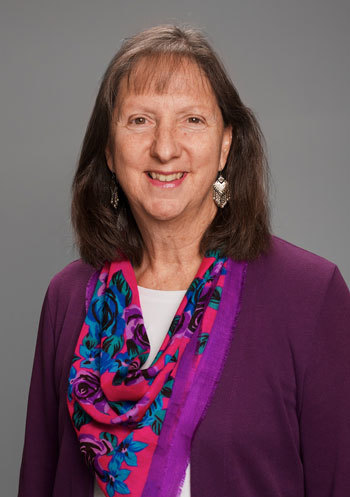 For the past three and a half years, Karen was a vital member of our Eternal Perspective Ministries staff, and brought with her a deep love for the Lord and a heart for ministry. (Part of her job involved responding to reader questions. Check out these articles, and you’ll get a taste of her wisdom, love for Jesus, and heart for people.)
For the past three and a half years, Karen was a vital member of our Eternal Perspective Ministries staff, and brought with her a deep love for the Lord and a heart for ministry. (Part of her job involved responding to reader questions. Check out these articles, and you’ll get a taste of her wisdom, love for Jesus, and heart for people.)
Before that, she and her family served for 23 years as missionaries in Africa. After she retired several weeks ago, she wrote me, “It was so good of our Father to allow me the privilege of being a little part of this great work. …I had no pretensions that I would ever find myself in ministry again. What a great Redeemer He is!”
Truly, the privilege was all ours.
Holiness and Happiness, Grace and Dignity
Karen and I also worked together years ago at my home church, Good Shepherd, when I was a pastor and we were both in our twenties and thirties. We often recounted our funny memories from 25-40 years ago.
One of the things I’ve thought about lately is how Karen is one of most beautiful blends of holiness and happiness I’ve ever known. I honestly can’t remember a time spent with her that I didn’t fully enjoy. She was simply delightful. She always made me, and everyone around her, smile and laugh.

I am also struck by her childlikeness, fully trusting her Heavenly Father even when she faced heartbreaks in her marriage and personal health problems. She responded with extraordinary dignity and grace at the end of a beloved overseas ministry, and God went on to use her powerfully in countless lives.
A Deep Reservoir
When Karen received her diagnosis, it was obvious the reservoir of her knowledge of God was deep. No crash course was necessary. She had done her homework for decades, and was well-prepared to lean on Him because she started long ago. She knew her God, and now she knows Him perfectly.
In one of her first journal entries about the return of her cancer, she wrote this:
Just before going to bed, I had opened a hefty medical bill. Then I woke up about 2:30 a.m. with my first wave of nausea on this treatment. It brought back a flood of memories from my first cancer treatments in 2011-12. When that bill also came to mind, I knew I needed a course correction! The Psalms are always good for that, so I opened my Kindle to the Psalms. There are 50 displayed on the screen and I touched the screen randomly. Psalm 39 came up—not random at all but just what I needed.
“O Lord, make me know my end and what is the measure of my days; let me know how fleeting I am! Behold, you have made my days a few handbreadths...And now, O Lord, for what do I wait? My hope is in you...Hear my prayer, O Lord, and give ear to my cry; hold not your peace at my tears! For I am a sojourner with you, a guest, like all my fathers. Look away from me, that I may smile again, before I depart.”
Just a reminder that He has our fleeting lives in His hands and our hope is in Him. We are all sojourners and guests here. And we can smile now along the journey, no matter what, if we know Him as our Savior. I'm so glad He’s helping me to smile!
Later she wrote:
I’ve had sweet times with my old hymnbook, and the Valley of Vision prayer book. A few lines from the latter spoke to me this week: “You are eternal wisdom in dispensations towards me; and it matters not when, nor where, nor how I serve You, not what trials I am exercised with, if I might but be prepared for Your work and will.”
Along with creation, my body is groaning under the weight of this disease. Paul taught us in Romans 8:22-23, “For we know that the whole creation has been groaning together in the pains of childbirth until now. And not only the creation, but we ourselves, who have the firstfruits of the Spirit, groan inwardly as we wait eagerly for adoption as sons, the redemption of our bodies.”
I’m waiting eagerly, and still smiling at His glorious future for me!
Anticipating Heaven
In “Is It Normal to Be Afraid to Go to Heaven?,” Karen wrote this in 2015:
I am SO excited about Heaven—seeing Jesus face to face, reconnecting with my family who have gone on to Heaven before me, meeting intriguing people I’ve read about, like Queen Esther and Deborah, and missionaries like Amy Carmichael and Helen Roseveare and Elisabeth Elliot…oh, I could go on and on.
 And now she is experiencing it firsthand. Surrounded by her sons Zac and Noah, her daughter-in-law Hannah, and her sister Kathy, she slipped into eternity as Hannah sang to her. Please pray for her boys and her family in these coming days.
And now she is experiencing it firsthand. Surrounded by her sons Zac and Noah, her daughter-in-law Hannah, and her sister Kathy, she slipped into eternity as Hannah sang to her. Please pray for her boys and her family in these coming days.
Karen: well done, good and faithful servant. You have entered your Master’s happiness. I already can’t wait to see you again, and worship Him with you. We’ll explore His New Earth together, all by His incredible grace. I look forward to laughing and feasting and singing and snorkeling with you there:
Then the angel showed me the river of the water of life, as clear as crystal, flowing from the throne of God and of the Lamb down the middle of the great street of the city. On each side of the river stood the tree of life, bearing twelve crops of fruit, yielding its fruit every month. And the leaves of the tree are for the healing of the nations. No longer will there be any curse. The throne of God and of the Lamb will be in the city, and his servants will serve him. They will see his face, and his name will be on their foreheads. There will be no more night. They will not need the light of a lamp or the light of the sun, for the Lord God will give them light. And they will reign for ever and ever. (Revelation 22:1-5)
Thoughts from the EPM staff
Linda Jeffries, office manager:
I could use so many words to describe Karen. Wise, godly, and smart, but also competitive, humorous, and cool. It became the running joke that if we had an office contest or competition that Karen would win, because she often did. She had this quiet sense of humor that was so fun and unexpected, making it even more special. She also had one of those rare qualities that made you feel as if you were the most important person in the room.
When we first hired Karen, I quickly realized that she and I were going to be polar opposites when it came to room temperature. She arrived at the office one morning in her puffy down coat, scarf, gloves, hat, sweater, slacks and probably wool socks. I looked down at my attire and saw no coat, a short sleeve shirt, slacks, and sandals (no socks). Oh goodness Karen, how we tried to keep the office warm for you. I think we probably failed, but we tried. I hope the Lord provides you with a tropical warm room. I know He’s been preparing it just for you!
Kathy Norquist, ministry development:
When I first thought of what I would write about Karen I started to make a list of adjectives to describe her, but then was reminded of the fruits of the Spirit: love, joy, peace, patience, kindness, goodness, faithfulness, gentleness, and self-control. She embodied them all and lived them out before us at the EPM office. And along with these she brought a deep reservoir of wisdom and grace, calmness, peace, and stability. Add to that her great sense of humor and who wouldn’t want to be around her? You could always count on Karen as rock-solid trustworthy. She faced her severe trials with the strength of the God she knew so well through the study of His Word. For me, the loss of her as a co-worker and friend is very great. But I smile thinking of her with Jesus.
Shauna Hernandez, marketing and communication specialist:
Karen was in charge of answering questions that came in from readers all over the world. She answered with such grace and compassion. I learned so much from her.
Karen walked through very difficult things in life, yet I never saw one ounce of bitterness in her! She truly had an eternal perspective and didn’t let hardships negatively define her.
Karen was someone who would get excited about the little things in your life with you, and would then turn around and fill the room with deep wisdom. She was so multi-faceted.
Stephanie Anderson, communications and graphics specialist:
In the three years I knew Karen, I quickly came to see why she was so special to so many. She showed such love and care for me by closely following my husband’s journey through unemployment. When she asked for an update on how he was doing—and she often did—it was clear she had been regularly praying for us. That touched me deeply.
I loved the beautiful, colorful scarves that frequently adorned Karen’s outfits. She also had a deeper kind of adorning: “Let your adorning be the hidden person of the heart with the imperishable beauty of a gentle and quiet spirit, which in God's sight is very precious” (1 Peter 3:4). This inner beauty and joy radiated from her, and I know it was the result of years of loving and learning more about her Savior.
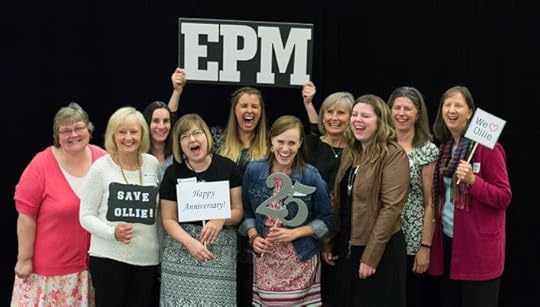
Sharon Misenhimer, ministry assistant:
The thing that stands out the most to me about Karen is that she had a deep abiding love for God and His word. He was her treasure, and her life showed it. She was an incredible prayer warrior and loved praying and seeing God work.
She had a humble and teachable spirit. She faithfully served Him through the good times and the bad. She embraced that God had a purpose and kingdom work for her to do until He took her home. She had a concern for all the precious people that God put in her path and wanted them to know Christ.
Karen had complete trust in God’s faithfulness, goodness, sovereignty, and His perfect plan for her life. She trusted that her times were in His hands and she eagerly awaited her glorious future with her Lord. She said she could “smile at her future because He is there.” She said, “I do not want to waste anything He has His purpose for, either in my life or those around me.”
She was a wonderful teaching leader for the women’s Bible study at her church. The last time Karen spoke in March she said, “We are to show the Kingdom to others around us, and we are to pray persistently for his Kingdom to come.”
Karen has touched and blessed my life and it has been such a privilege to work with her and get to know her. I can’t wait to be with her again in eternity.
Brenda Abelein, ministry assistant:
I knew about Karen originally as a missionary from my home church. I was a prayer partner for her family over many years. My two children are the same age as her sons, so when she wrote in 2013 about kids growing up and leaving home, I could totally relate. The verses she included really encouraged me, so I wrote to thank her. She replied immediately, and a sweet email relationship began. I treasure those emails.
When she started working at EPM, our now real-life friendship seemed immediately connected. On Wednesday afternoons it was usually just Karen and me in the office, and we’d sometimes take a break together to talk about and pray for our kids. I miss my Wednesdays with Karen.
On March 16 I drove her to the ER and spent the day at the hospital with her. I watched as she had intentional conversations with every single person who attended to her (even the ones who came to clean her room!), asking their names and if she could share a booklet with them. She always had a stock of Randy Alcorn's Heaven booklets and tracts in her purse. People knowing Jesus was always Karen’s highest priority. Her eyes got bright and her usually quiet and reserved demeanor became confident and outspoken when she was talking about Jesus!
It was only 86 days from that day until she passed away last Sunday. None of us expected it to be so fast. She handled every day "...clothed in strength and dignity, and [laughing] without fear of the future" (Proverbs 31:25), the verse she said God had impressed on her heart just a few weeks before. He knew she would be needing it. This verse will now always remind me of Karen, and watching her live this verse out will be a constant encouragement for me.
It’s hard for me to understand how Karen’s purpose on earth could already have been fulfilled. But I’m choosing to trust that God’s timing is perfect. That’s what Karen would do. ❤
June 13, 2018
God’s Presence Is the Essence of Heaven

The 1998 movie What Dreams May Come portrays Heaven as beautiful but lonely, because a man’s wife isn’t there. Remarkably, someone else is entirely absent from the movie’s depiction of Heaven: God.
That movie’s viewpoint mirrors numerous contemporary approaches to Heaven which either leave God out or put him in a secondary role.
The Five People You Meet in Heaven, a best-selling novel by Mitch Albom, portrays a man who feels lonely and unimportant. He dies, goes to Heaven, and meets five people who tell him his life really mattered. He discovers forgiveness and acceptance, all without God and without Christ as the object of saving faith.
Five People portrays a Heaven that isn’t about God and our relationship with him, but only about human beings and our relationships with each other. A Heaven where humanity is the cosmic center, and God plays a supporting role. The Bible knows nothing of this pseudo-Heaven.
Numerous people claim to have gone to Heaven and seen loved ones and also Jesus, yet almost never do they react as the “beloved disciple,” the apostle John, did: “When I saw him, I fell at his feet as though dead” (Revelation 1:17).
Surely no one who had actually been in Heaven would neglect to mention what Scripture shows is its main focus. If you had spent an evening dining with a king, you wouldn’t just talk about the place settings! When John was shown Heaven and wrote about it, he recorded the details—but first and foremost, from beginning to end, he kept talking about Jesus, the Lion and the Lamb, with infinite gravitas and beauty.
A Honeymoon without a Groom?
Jesus promised his disciples, “I will come back and take you to be with me that you also may be where I am” (John 14:3). For Christians, to die is to “be present with the Lord” (2 Corinthians 5:8, NKJV). The apostle Paul says, “I desire to depart and be with Christ, which is better by far” (Philippians1:23). He could have said, “I desire to depart and be in Heaven,” but he didn’t—his mind was on being with Jesus.
Heaven without God would be like a honeymoon without a groom or a palace without a king. Teresa of Avila said, “Wherever God is, there is Heaven.” The corollary: Wherever God is not, there is Hell.
The presence of God is the essence of Heaven. John Milton put it, “Thy presence makes our Paradise, and where Thou art is Heaven.” Heaven will be a physical extension of God’s goodness.
Samuel Rutherford said, “O my Lord Jesus Christ, if I could be in heaven without thee, it would be a hell; and if I could be in hell, and have thee still, it would be a heaven to me, for thou art all the heaven I want.” To be with God—to know him, to see him—is the central, irreducible draw of Heaven.
Heaven’s Greatest Miracle
The best part of Heaven on the New Earth will be enjoying God’s presence. He’ll actually dwell among us (Revelation 21:3-4). Just as the Holy of Holies contained the dazzling presence of God in ancient Israel, so will the New Jerusalem contain his presence. The New Earth’s greatest miracle will be our continual, unimpeded access to the God of everlasting splendor and perpetual delight.
What is the essence of eternal life? “That they may know you, the only true God, and Jesus Christ, whom you have sent” (John 17:3). The best part of Heaven will be knowing and enjoying God.
Sam Storms writes, “We will constantly be more amazed with God, more in love with God, and thus ever more relishing his presence and our relationship with him. Our experience of God will never reach its consummation. …It will deepen and develop, intensify and amplify, unfold and increase, broaden and balloon.”
The Reservoir that Will Never Run Dry
Because He is beautiful beyond measure, if we knew nothing more than that Heaven was God’s dwelling place, it would be more than enough to make us long to be there.
Of course we will enjoy all the secondary gifts God gives us, but they will be derivative of God Himself, and our happiness in them will be happiness in him. Jonathan Edwards said, “The redeemed will indeed enjoy other things…but that which they shall enjoy in the angels, or each other, or in anything else whatsoever, that will yield them delight and happiness, will be what will be seen of God in them.”
“They feast on the abundance of your house; you give them drink from your river of delights. For with you is the fountain of life” (Psalm 36:8-9). This passage portrays the joy that God’s creatures find in feasting on Heaven’s abundance, and drinking deeply of his delights. Notice that this river of delights flows from and is completely dependent on its source: God. He alone is the fountain of life, and without Him there could be neither life nor abundance and delights.
The Ultimate Wonder
We may imagine we want a thousand different things, but God is the one we really long for. “O God, you are my God, earnestly I seek you; my soul thirsts for you, my body longs for you, in a dry and weary land where there is no water” (Psalm 63:1). God’s presence brings satisfaction; his absence brings thirst and longing.
Our longing for Heaven is a longing for God—a longing that involves not only our inner beings, but also our bodies. Being with God is the heart and soul of Heaven. Every other heavenly pleasure will derive from and be secondary to his presence.
All our explorations and adventures and projects in the eternal Heaven—and I believe there will be many—will pale in comparison to the wonder of being with God and entering into his happiness. Yet everything else we do will help us to know and worship God better.
God’s greatest gift to us is now, and always will be, nothing less than himself.
For more on eternity, browse Randy’s books on Heaven.
Photo by Steve Halama on Unsplash
June 11, 2018
It Is Possible to Be a Feminist and Be Prolife

Early women’s rights advocates were prolife, not proabortion. Susan B. Anthony was a radical feminist in her day. Her newspaper, The Revolution, made this claim: “When a woman destroys the life of her unborn child, it is a sign that, by education or circumstances, she has been greatly wronged.”
Another leading feminist, Elizabeth Cady Stanton, commented on abortion this way: “When we consider that women are treated as property, it is degrading to women that we should treat our children as property to be disposed of as we wish.”
The early feminists opposed abortion. They were followed by a new breed of feminists, such as Margaret Sanger, founder of Planned Parenthood, who advocated abortion as a means of sexual freedom, birth control, and eugenics.
There are feminists today who still uphold the prolife position. Feminists for Life is a very active group started in the early 1970s. FFL supported the Equal Rights Amendment and has labored for other feminist goals, but is adamantly prolife. One FFL member, Mary Ann Schaefer, has labeled the attempt to marry feminism to abortion as “terrorist feminism.” In her words, it forces the feminist to be “willing to kill for the cause you believe in.” [1]
Both men and women should be free to affirm certain platforms of the feminist movement without affirming others. One may support some or most feminist ideals, while wholeheartedly opposing abortion because it kills children.
Recently I viewed a new documentary, Pro-Life Feminist, which powerfully dispels the myth that to be prolife you must be predictably white, conservative, Republican, or Christian. These bright articulate women have a clear understanding of the facts about human life, and speak from a true feminist perspective. Their no-nonsense clarity about the preciousness of human life reminds us that we share basic values with many who may be very different than we are in some areas. These perspectives are a refreshing contrast to the fog of prochoice confusion that permeates our culture. I highly recommend this video.
Here’s more about it:
In this half-hour documentary, Christina Marie Bennett, Aimee Christine Murphy, and Destiny Herndon-De La Rosa bridge feminist and pro-life perspectives with candor, humor, and respect, finding more common ground than either side typically realizes. Told without a narrator, these three women share their individual journeys with vulnerability and honesty, making the film a perfect catalyst for discussion groups and anyone seeking a fresh perspective on this otherwise divisive issue.
Watch the trailer here:
Visit their site to learn more about buying the DVD or renting the video online.
[1] Mary Ann Schaefer, quoted by Catherine and William Odell, The First Human Right (Toronto: Life Cycle Books, 1983), 39–40.
Photo by Chris Benson on Unsplash
June 8, 2018
What Does the Bible Mean When It Talks About God Hardening People’s Hearts?

Recently someone asked a great question about God hardening people’s hearts in Scripture.
Fourteen times in Scripture a statement is made that God hardens someone’s heart (15 if we count John 12:40 where the “He” may be read as a reference to God or perhaps to Isaiah –see Isaiah 6:9-10). Nine of those times are in relation to Pharaoh. [1]
In most of the cases throughout Scripture, it’s clear that God hardens hearts only after a long track record of disobedience. But when someone, such as Pharaoh, maintains their willful disobedience, then decides to let up on it in order to ease the painful consequences (e.g. to escape a plague), God may say, “No, you are not truly repenting, therefore I will harden your heart to keep you from stopping your sinful actions only to make things easier on yourself. I will not let you use me. But after giving you a lifetime of freedom to choose, I will now use you to accomplish my purposes, because I am God and you are not.”
The hardening of the heart is essentially a sort of final judgment of God that takes place before someone dies. It’s as if God considers now fixed someone’s evil heart as it has become over a lifetime. He cements the deal, so to speak, solidifying the history of their own willful sinful choices, which He now considers their definitive condition, and then forces them to act accordingly and face the consequences they would otherwise have tried to avoid. (For more on God’s sovereignty trumping people’s plans, check out Psalm 115:3, Proverbs 16:9, Genesis 50:20, Isaiah 40:23, and 2 Chronicles 20:6.)
That’s my take on it, and here are the links that all have something unique to contribute on the meaning of God hardening hearts:
Why Does God Harden Hearts? This one covers all the references to hardened hearts, including Joshua 11.
Hardening, Hardness of Heart Provides a short overview of hardening of hearts in the Bible.
Why Did God Harden Pharaoh’s Heart? Discusses the meaning of God hardening Pharaoh’s heart, which is mentioned more often than any other.
What Are the Causes and Solutions for a Hardened Heart?
Does God Harden a Believer’s Heart? An excellent answer from my friend Tony Reinke.
[1] Why Does God Harden Hearts?
Photo by Allef Vinicius on Unsplash
June 6, 2018
Guidelines for Talking to Your Kids about Sex

Every child receives a sex education. The only questions are: (1) When? (2) Where? (3) From whom? Parents should be their ultimate sex educators.
Here are some guidelines parents may find helpful in teaching their children about sex:
If you don’t know the facts, don’t be embarrassed—just find them out. In this sex-saturated culture, everybody thinks we should know everything about sex. But often we don’t.
Ask your pastor and other parents you respect for advice in what to say and how and when to say it. There are many fine resources for Christian parents, including the God’s Design for Sex series, James Dobson’s Preparing for Adolescence, and Focus on the Family’s Guide to Talking with Your Kids About Sex: Honest Answers for Every Age. Also see FamilyLife Today’s series on A Biblical Approach to Sex Education.
Always teach sex in the context of values, responsibility, and marriage. When you teach your children anatomy, don’t do it as if their sex organs are parts of a car engine. Relate them to their purpose.
Sex is so much more than biology. It is a matter of ethics and morality as well. If you create a tie between sex and marriage when your children are young, they will find it hard to conceive of sex having a place outside of marriage. And that’s exactly as it should be. In contrast, sex education in the schools often isolates sex from its proper spiritual and ethical implications.
Know your child. Some children are sexually precocious; others are not. Some need to hear direct and to the point answers. Others respond better to a more subtle approach. You are the parent—no one is better qualified than you to discern what your child is ready to hear.
Answer your child’s questions honestly. This may require some forethought. It is good to anticipate some of the questions that will be coming your way.
One of the classic questions is “Where do babies come from?” or “How does a baby get inside his Mommy’s tummy?” To a younger child you might explain it this way: “Mommy and Daddy love each other, so they hold each other close, and sometimes God decides to make a baby—part from Mommy and part from Daddy.”
Tell them as much as they need to know now. A five-year-old does not need to see a diagram of sexual intercourse, nor does he need to be told “The baby’s in Mommy’s uterus, not her tummy.” Not every technical error needs to be corrected at an early age. Giving too much information too early may overwhelm a child. Discussing details of sexual intimacy can push a child to “grow up” sexually before his time (a major danger fostered by the media).
On the other hand, an eleven-year-old needs to know a great deal more than a five-year-old. If Mom and Dad don’t explain sexual intercourse to him, someone else will very soon (if they haven’t already) and probably not in the nicest way.
Still, the eleven-year-old doesn’t need to know about matters such as premature ejaculation and birth control. In fact, things such as these would be better learned very shortly before marriage.
Unfortunately, the bombardment of sexual information (and misinformation) is so great that many twelve-year-olds know a great deal about sex. Once a child—whether too young or not—has learned something about sexual relations, parents need to be sure he has the right information and the right perspective. If anyone else is teaching your children about sex, find out exactly what’s being said.
Don’t procrastinate. Too much too soon is one problem. Too little too late is another. It’s too easy to wait for the right opportunity that never comes. Sometimes our children have already been misinformed or developed irrational fears about sex, and it’s always harder to correct wrong thinking than to prevent it.
Don’t try to calculate your child’s exact date of puberty, then start telling him about sex the night before. It can be traumatic for boys to ejaculate and not understand what has happened, and even worse for girls to begin menstruating with no or only partial information. By the time some parents get around to telling their children about sex, their children know more than they do.
Remember, it’s much easier to tell a twelve-year-old about sex than do what many Christian parents have done—had their first heart-to-heart talk about sex with their pregnant fifteen-year-old.
Don’t come on too strong. It’s best to spread things out, not dump the whole load of sexual knowledge at once. It’s easy to overwhelm children not only with information but with emotions, especially negative ones. Difficult subjects like homosexuality also need to be discussed with children at the appropriate age level, which due to its visibility in our culture, is becoming younger and younger. If a child is starting to see and hear things on a sexual subject, it’s certainly time for parents to share their perspectives and be there to answer questions.
Parents should be careful not to sound threatening or angry—they should be calm and remain approachable or their children will repress and hide their sexual questions and struggles for fear of rejection.
Be positive. Some parents tell their children about sex only because they have to. But they are so uncomfortable and tentative that, without meaning to, they communicate, “This is an unpleasant and shady thing we’re talking about. I wish I was somewhere else, don’t you?”
I know one girl who learned about menstruation through a note from her mother—passed under her bedroom door. This clandestine approach made a strong negative statement about female sexuality.
Talk about how sex is God’s gift and how good sex can be inside marriage. Don’t be ashamed to talk about what God wasn’t ashamed to create!
Parents of preteens and teens might consider going through my book The Purity Principle together. I’ve also put together Guidelines for Sexual Purity, which I’ve presented to many young people and their parents over the years. When my now married daughters were teenagers, I honed it further for sharing and discussion with them and the young men who asked to date them. Passport2Purity is another resource Christian parents have used and recommended.
Photo by Sladic on iStock



